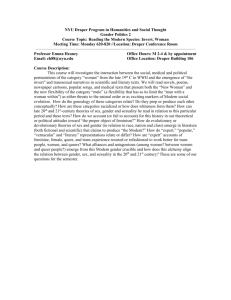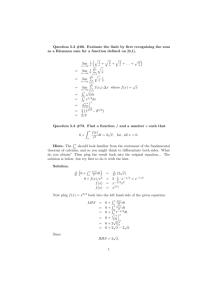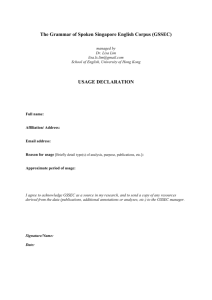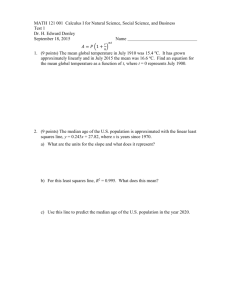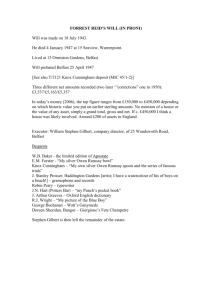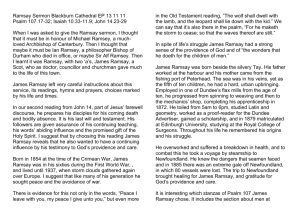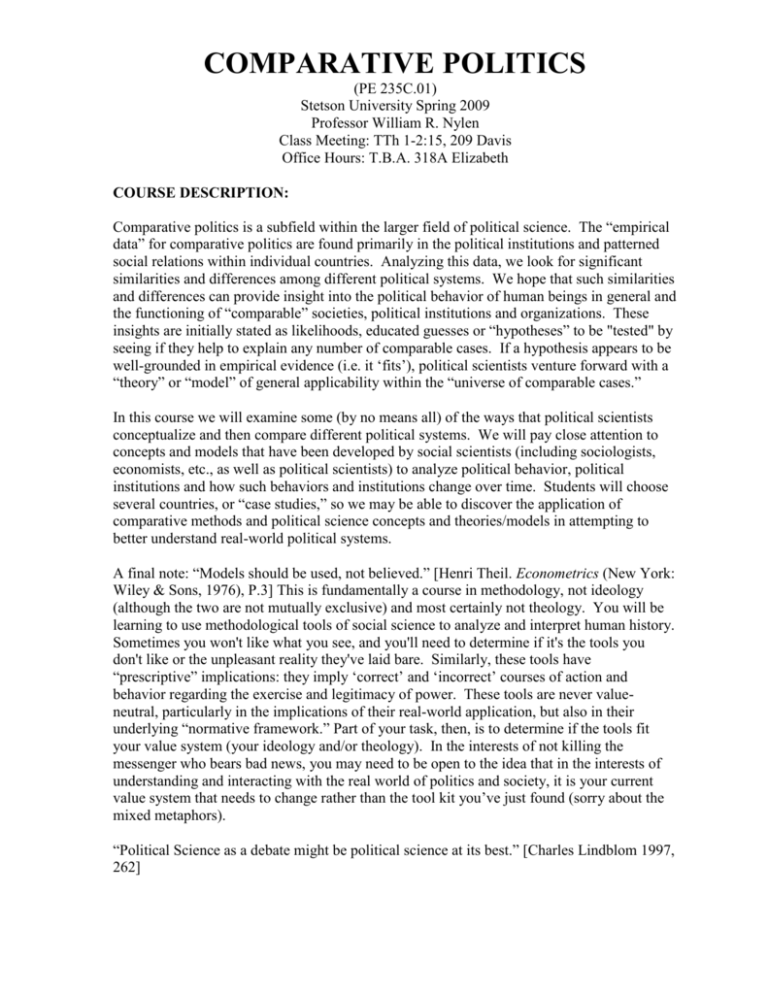
COMPARATIVE POLITICS
(PE 235C.01)
Stetson University Spring 2009
Professor William R. Nylen
Class Meeting: TTh 1-2:15, 209 Davis
Office Hours: T.B.A. 318A Elizabeth
COURSE DESCRIPTION:
Comparative politics is a subfield within the larger field of political science. The “empirical
data” for comparative politics are found primarily in the political institutions and patterned
social relations within individual countries. Analyzing this data, we look for significant
similarities and differences among different political systems. We hope that such similarities
and differences can provide insight into the political behavior of human beings in general and
the functioning of “comparable” societies, political institutions and organizations. These
insights are initially stated as likelihoods, educated guesses or “hypotheses” to be "tested" by
seeing if they help to explain any number of comparable cases. If a hypothesis appears to be
well-grounded in empirical evidence (i.e. it ‘fits’), political scientists venture forward with a
“theory” or “model” of general applicability within the “universe of comparable cases.”
In this course we will examine some (by no means all) of the ways that political scientists
conceptualize and then compare different political systems. We will pay close attention to
concepts and models that have been developed by social scientists (including sociologists,
economists, etc., as well as political scientists) to analyze political behavior, political
institutions and how such behaviors and institutions change over time. Students will choose
several countries, or “case studies,” so we may be able to discover the application of
comparative methods and political science concepts and theories/models in attempting to
better understand real-world political systems.
A final note: “Models should be used, not believed.” [Henri Theil. Econometrics (New York:
Wiley & Sons, 1976), P.3] This is fundamentally a course in methodology, not ideology
(although the two are not mutually exclusive) and most certainly not theology. You will be
learning to use methodological tools of social science to analyze and interpret human history.
Sometimes you won't like what you see, and you'll need to determine if it's the tools you
don't like or the unpleasant reality they've laid bare. Similarly, these tools have
“prescriptive” implications: they imply ‘correct’ and ‘incorrect’ courses of action and
behavior regarding the exercise and legitimacy of power. These tools are never valueneutral, particularly in the implications of their real-world application, but also in their
underlying “normative framework.” Part of your task, then, is to determine if the tools fit
your value system (your ideology and/or theology). In the interests of not killing the
messenger who bears bad news, you may need to be open to the idea that in the interests of
understanding and interacting with the real world of politics and society, it is your current
value system that needs to change rather than the tool kit you’ve just found (sorry about the
mixed metaphors).
“Political Science as a debate might be political science at its best.” [Charles Lindblom 1997,
262]
COURSE REQUIREMENTS -- Grades will be based on performance in the following:
-- Frequent "pop quizzes" (20%)
-- Midterm exams of essays and short answer/identifications (20%)
-- A final exam of essays and short answer/identifications (20%)
-- Class attendance and participation in class discussions (10%)
-- One classroom presentation (5%)
-- Final Paper (25%)
-- Prof. Nylen stands by Stetson's official statement on grades:
Grades represent the instructor's final estimate of the student's performance in a
course. The grade of A (+ or -) may be interpreted to mean that the instructor
recognizes exceptional capacity and exceptional performance. The grade of B (+ or -)
signifies that the student has gained a significantly more effective command of
material than is generally expected in that course. The grade or C or C+ is the
instructor's certification that the student has demonstrated the required mastery of the
material. A student is graded C- or D (+ or -) when his/her grasp of the course
essentials is minimal. The F grade indicates failure to master the essentials and the
necessity for repeating the course before credit may be earned. [Stetson University
Bulletin, 2008-2009]
-- Any form of cheating or plagiarism will result in an automatic F grade for the entire
course. To plagiarize is ...
“To take and pass off as one’s own (the ideas, writings, etc. of another).” [Webster’s
New World Dictionary of the American Language (1962)]
-- No late papers or make-ups of exams will be allowed unless you have a really, really,
really good excuse, plus documentary evidence if requested by the professor.
-- Significant improvement through the semester can result in an upgrade of half a letter
grade.
BOOKS REQUIRED FOR PURCHASE (on sale in the bookstore):
Alan Draper & Ansil Ramsay. The Good Society: An Introduction to Comparative Politics
(New York: Pearson-Longman, 2008).
Timothy C. Lim. Doing Comparative Politics: And Introduction to Approaches and Issues
(Boulder: Lynne Rienner, 2006).
ADDITIONAL READINGS:
Some required readings for this course are available via electronic link on the Blackboard site
for the class. These readings are equally as important as the books required for purchase.
COURSE OUTLINE:
T.
1/13
Introduction to the Course
Th.
1/15
Basics, Pt. 1 (Comparative Politics)
-- Required Reading: Lim, Preface (xi-xiv) & Chapter One (3-30)
-- Suggested Reading: John Dryzek “Revolutions without enemies: key
transformations in political science” American Political Science Review,
V.100, No.4 (Nov.2006): 487-492. [blackboard]
T.
1/20
Basics, Pt. 2 (The Comparative Method)
-- Required Reading: Lim, Chapter Two (31-63)
-- Suggested: John Gerring. “What is a Case Study and What is it Good For?”
[partial] The American Political Science Review, 98/2 (May 2004): 341-4.
[blackboard]
Th.
1/22
Basics, Pt. 3 (Rationality Theory)
-- Required Reading: Lim, Chapter Three [partial], pt. 1 (Pp.65-79)
Suggested: Elinor Ostrom. “A Behavioral Approach to the Rational Choice
Theory of Collective Action: Presidential Address, American Political Science
Association, 1997” The American Political Science Review, 92/1 (March
1998): 1-22. [blackboard]
T.
1/27
Basics, Pt. 4 (Structural Theory)
-- Required Reading: Lim, Chapter Three [partial], pt. 2 (Pp.79-86)
Also Required (NOT optional): Eduardo Galeano. “The Thirteen Northern
Colonies and the Importance of Not Being Born Important” Open Veins of
Latin America: five centuries of the pillage of a continent (New York:
Monthly Review Press, 1973): 130-33. [blackboard]
-- Suggested: William R. Nylen. “The Global Financial Crisis of 1998-99 v.s.
Democracy” Independent Voice (October 1999).
Th.
1/29
Basics, Pt. 5 (Cultural Theory)
-- Required Reading: Lim, Chapter Three [partial], pt. 3 (Pp.86-93)
-- Also Required (again, NOT optional): Lawrence E. Harrison. “To
Modernize, Some Have to Change Their Culture” in International Herald
Tribune (3/1/2001). [blackboard]
T.
1/3
Questions, Pt. 1 (Why are poor countries poor?)
-- Required Reading: Lim, Chapter Four (97-124)
Th.
2/5
Questions, Pt. 2 (Why is East Asia rich?)
-- Required Reading: Lim, Chapter Five (125-56)
T.
2/10
Questions, Pt. 3 (What makes a democracy?)
-- Required Reading: Lim, Chapter Six (157-201)
Th.
2/12
Questions, Pt. 4 (What makes a terrorist?)
-- Required Reading: Lim, Chapter Seven (202-231)
T.
2/17
Questions, Pt. 5 (What makes a social movement?)
-- Required Reading: Lim [with Atsuko Sato], Chapter Eight (233-261)
Th.
2/19
Globalization and Comparative Politics
-- Required Reading: Lim, Chapter Nine (265-290)
T.
2/24
Midterm Review
1. Important terms, concepts, definitions
2. Key debates
3. Conclusions
Th.
2/26
Midterm Exam
3/2-6
Spring Break
T.
3/10
Bringing Values & Institutions Back In, Pt. 1
-- Required Reading: Draper & Ramsay, Introduction (xiii-xix) & Chapter
One (1-21)
Th.
3/12
Bringing Values & Institutions Back In, Pt. 2 (Institutions and Regimes)
-- Required Reading: Draper & Ramsay, Chapter Two (22-55)
T.
3/17
Bringing Values & Institutions Back In, Pt. 3 (States and Markets)
-- Required Reading: Draper & Ramsay, Chapter Three (56-89)
Th.
3/19
Case Studies, Pt. 1 (Rich Democracies & Regimes in RDs)
-- Required Reading: Draper & Ramsay, Chapter Four (90-116) & Chapter
Five (117-148)
T.
3/24
Review of Draper & Ramsay so far; discuss upcoming assignments
1. Important terms, concepts, definitions
2. Key debates
3. Conclusions
Th.
3/26
Case Studies, Pt. 2 (Sweden)
-- Required Reading: Draper & Ramsay, Chapter Six [partial] (149-161)
-- SAMPLE PRESENTATION
T.
3/31
Case Studies, Pt. 3 (United States)
-- Required Reading: Draper & Ramsay, Chapter Six [partial] (161-170)
-- STUDENT PRESENTATIONS
Th.
4/2
Case Studies, Pt. 4 (Germany)
-- Required Reading: Draper & Ramsay, Chapter Six [partial] (170-182)
-- STUDENT PRESENTATIONS
T.
4/7
Case Studies, Pt. 5 (LDCs and Regimes in LDCs)
-- Required Reading: Draper & Ramsay, Chapter Seven (183-211) & Chapter
Eight (212-243)
Th.
4/9
Case Studies, Pt. 6 (South Korea)
-- Required Reading: Draper & Ramsay, Chapter Nine [partial] (244-254)
-- STUDENT PRESENTATIONS
T.
4/14
Case Studies, Pt. 6 (Nigeria)
-- Required Reading: Draper & Ramsay, Chapter Nine [partial] (254-263)
-- STUDENT PRESENTATIONS
Th.
4/16
Case Studies, Pt. 7 (Chile)
-- Required Reading: Draper & Ramsay, Chapter Nine [partial] (263-274)
-- STUDENT PRESENTATIONS
T.
4/21
Case Studies, Pt. 8 (Brazil)
-- Required Reading: Draper & Ramsay, Chapter Nine [partial] (274-290)
-- STUDENT PRESENTATIONS
Th.
4/23
Case Studies, Pt. 9 (China)
-- Required Reading: Draper & Ramsay, Chapter Ten
-- STUDENT PRESENTATIONS
T.
4/28
Final Exam Study Session
Th.
4/30
Final Papers Due: Blackboard Dropbox and/or email:
wnylen@stetson.edu (no class meeting)
Fri.
5/1 (4-6) FINAL EXAM

